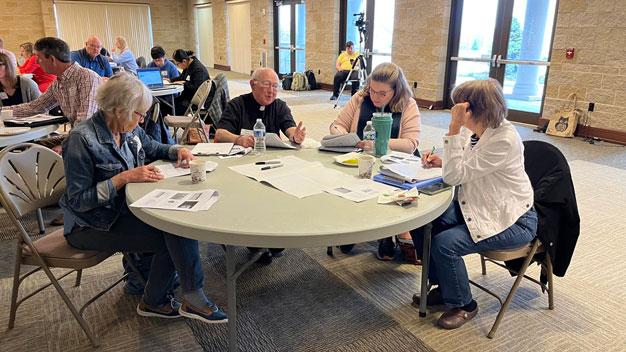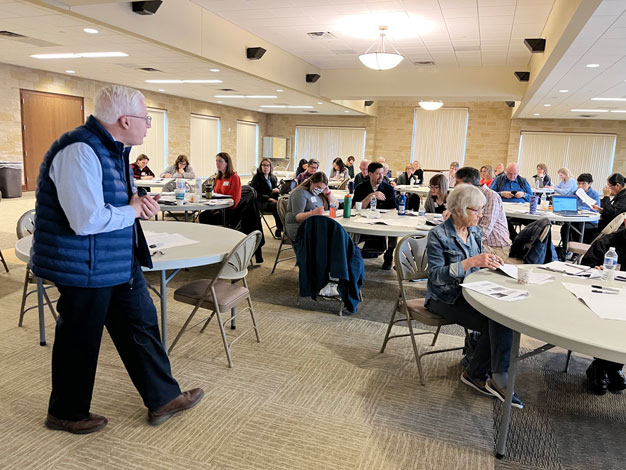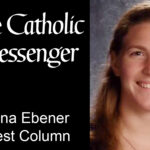
Father Paul Connolly, pastor of St. Alphonsus Parish in Mount Pleasant, brainstorms with other participants of the Diocese of Davenport’s Catholic Faith Formation in a Post-Pandemic World series at St. Patrick Parish in Iowa City last month.
By Lindsay Steele
The Catholic Messenger
A majority of parish faith formation programs are centered on one-size-fits-all, “assembly line” programming, said John Roberto, author and founder of Lifelong Faith Associates. By meeting people where they’re at, faith formation programs can help parish communities grow. “When you start with the people — their needs, their situations and their spiritual journeys — you can never go wrong.”
Roberto shared this message with clergy and lay ministers last month during the final installment of the Diocese of Davenport’s Catholic Faith Formation in a Post-Pandemic World series at St. Patrick Parish in Iowa City.
The series included two in-person workshops and three webinars. Participants learned about age-specific ministries, family and intergenerational programming, hospitality, and the need to reach out through a variety of mediums. “Previously, all programming was directed toward active Catholics, but there are also other groups: unaffiliated, uninvolved and ‘occasionals.’ These are all baptized Catholics,” Roberto explained. “That’s your parish community.”
He said transforming parish faith formation programs requires a multi-year effort that takes patience. He encouraged participants to “find something you aren’t doing or find something that’s really broken that you can try something new on.”
Julia Jones, youth minister of St. Ann Parish in Long Grove, said Roberto’s workshop was the series highlight. “He really brought some clarity to a complex future in ministry.” The workshop offered participants the opportunity to think about pre-pandemic ministry, what worked, what didn’t and “where to go from here.” She said she walked away with “a ton of notes and some energy to get back into the office to start planning with our parish team.”
Dan Teets, who directs RCIA (Rite of Christian Initiation of Adults) at the Newman Catholic Student Center in Iowa City and Adult Spiritual Formation at St. Mary Parish in Iowa City, was inspired by Roberto’s reference to the Netflix series Salt, Fat, Acid, Heat. “According to Samin Nosrat, the cook in the series, knowing the basic elements of cooking and how to combine them can help us to be better cooks. John was telling us in this workshop that, if we know the basic elements of lifelong formation and how to combine them, it can help us to be better evangelists and share the Gospels and Jesus with others.”

John Roberto, author and founder of Lifelong Faith Associates, speaks to clergy and lay ministers April 28 during the final session of the Diocese of Davenport’s Catholic Faith Formation in a Post-Pandemic World series at St. Patrick Parish in Iowa City.
Reflecting on the series, Luke Gregory said he appreciated speaker Jane Angha’s focus on hospitality in the first workshop. She “stressed the importance of providing hospitality in our ministry efforts,” added Gregory, who directs RCIA, Lifelong Faith Formation and Senior High Youth Ministry for Sacred Heart Parish in Newton. Executing hospitality — in every area, from sacramental preparation sessions with parents and children to RCIA sessions with inquirers — “can set the stage for what is coming next while helping participants to feel welcomed and comfortable. The added bonus with hospitality is that it can be utilized with any age group one is ministering to! I look forward to seeing the impact that being intentional in this area can play in my ministry efforts here at Sacred Heart!”
Father Paul Connolly appreciated the series for looking at the possibilities regarding the use of technology that became necessary during the pandemic and “making the shift to utilize what we learned to reach out to a tech generation.” The pastor of St. Alphonsus Parish in Mount Pleasant added, “It was very interesting to hear about how to help make faith formation intergenerational and how to help the family grow in faith together.” As the speakers pointed out, “change does not happen quickly, but it can lead to great growth.”
Seminarian Dane Dickinson, an intern at Our Lady of Victory Parish in Davenport, believes the work of clergy and lay ministers in faith formation will have a direct impact on the Church’s future. “I think this is especially true as we try to discern how to engage families and create a culture of lifelong learning.” He thought the series provided a good starting point for conversations regarding faith formation post-pandemic. “I do think it is important for us to recognize that the needs of our people are changing and that we must be willing to adapt so that we might meet those changing needs. Many of the speakers asked questions that elicited reflection, causing us to consider why we run our programs the way that we do. If the reason behind our work is ‘because that is the way it has always been done,’ we probably need to rethink our methods.”
Don Boucher, diocesan director of Faith Formation, said his office would seek feedback from participants and explore ways to support them as they work to transform their ministries. “Thanks for taking the risk, jumping in and taking part,” he told participants at the series’ conclusion. “We hope to do more of this in the future.”











